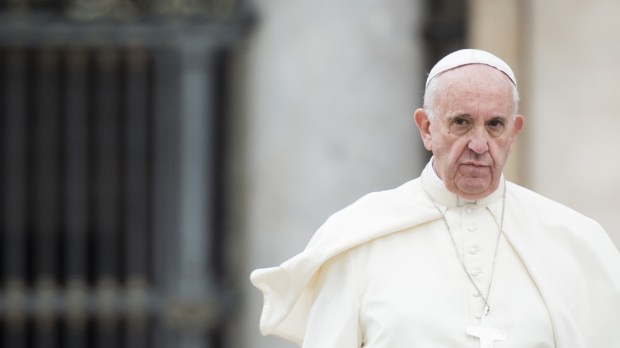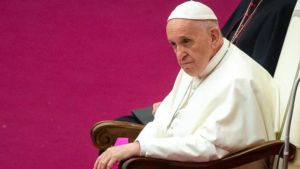In a wide ranging interview with the Associated Press, published on January 25, 2023, Pope Francis explained how he had a “conversion moment” on the issue of abuse within the Church during his 2018 trip to Chile. He also commented on two important abuse accusations that have emerged over the last months.
The first concerns an East Timorese Nobel Peace Prize-winning Bishop, Carlos Ximenes Belo, and the second a Slovenian Jesuit artist, Father Marko Rupnik, whose paintings are found in churches all over the world.
A “wake up” call
Pope Francis explained that on his return flight from his trip to Chile in 2018 he experienced a “conversion” on the issue of abuse, after he had defended a bishop who had not taken action against a priest who had abused many minors.
“I couldn’t believe it. You were the one on the plane who told me, ‘No, that’s not the way it is, Father,’” Pope Francis said in the interview, referring to the persistent questioning of the AP Vatican correspondent, Nicole Winfield, during the press conference on the plane. She also conducted the January 25 interview.
“That’s when the bomb went off,” the Pontiff continued, making an exploding gesture with his hands. That’s “when I saw the corruption of many bishops,” he added. “There you witnessed that I myself had to wake up to cases that were all covered up, didn’t I?”
The Pope was referring to the case of Juan Barros, appointed a bishop in 2015, and then defended by the Pope on various occasions afterward.
“The day I’m presented with proof against Bishop Barros, I will see,” Francis told journalists as he arrived in Iquique, in northern Chile, during his visit there in January 2018.
Read how the case progressed here.
The case of Bishop Belo
Bishop Carlos Ximenes Belo was Apostolic Administrator of the diocese of Dili, capital of East Timor in South East Asia, from 1998 to 2002. He was allowed to retire at the age of 54, almost 20 years earlier than the normal age, officially due to health problems. He is known as an independence hero for having peacefully opposed the Indonesian occupation of the country in the late 1900s and won a Nobel Peace Prize for his efforts in 1996.
In September 2022 a Dutch magazine revealed the stories of two victims who had accused Bishop Belo of abusing them in the 1990s. Soon after the claims emerged, the Holy See stated it had sanctioned the Timorese prelate in 2020 and then modified and reinforced their decisions in 2021. These restrictions included limitations on travel and the exercise of his ministry, a ban on voluntary contact with minors, on interviews, and on travel to Timor Leste.
In the AP interview the Pope said that this case is “a very old thing where this awareness of today did not exist.” When the Dutch article came out the Pontiff said, “let it be aired, what are you going to do, I’m not going to cover it up.”
“But these were decisions made 25 years ago when there was no such awareness,” he explained to AP, suggesting that indeed Bishop Belo may have been allowed to retire early, rather than face persecution, in order to avoid scandal. “But today there is total transparency,” the Pontiff said.
An investigation published by French dailyLa Croix, on the same day as the AP interview, details the culture of silence in East Timor surrounding Bishop Belo’s alleged abuses due to his reputation as an independence leader.
The case of Father Rupnik
The accusations surrounding Slovenian Father Marko Rupnik emerged instead in December 2022. Certain Italian blogs reported that the famous Jesuit artist had been accused of sexually, spiritually, and psychologically abusing several consecrated women in a community he founded in Slovenia in the 1990s.
Father Rupnik was reportedly close to Pope Francis. His works can be found in churches around the world and he often held spiritual exercises and preached at retreats, including at the Vatican in 2020.
After the accusations were made public, the Jesuits stated that there had been several complaints against the Slovenian priest however they were not investigated as they had reached the statute of limitations. Additionally the Society of Jesus said Father Rupnik had been excommunicated briefly in 2020 for having absolved in confession someone he had had sexual relations with, a crime that carries automatic excommunication. However this was reversed after a month since he repented for his actions.
The Pope said that these revelations were “a very big surprise” to him and also a “wound.” He however insisted that he “had nothing to do with” the case, other than intervene procedurally to ensure that a second set of accusations was heard by the same court as the first so as to not let everything get “muddled up.”
The issue of “vulnerable adults”
In the AP interview Pope Francis also recognized that the Church needs to keep working against the abuse of “vulnerable adults.” The Pontiff legally expanded the definition of this category of people, in a motu proprio published in 2019.
During the interview he explained that “vulnerable adults” could be those who are weakened because they are “sick,” “have psychological incapacities,” have “dependence” or are victims of a relationship of “seduction.”


